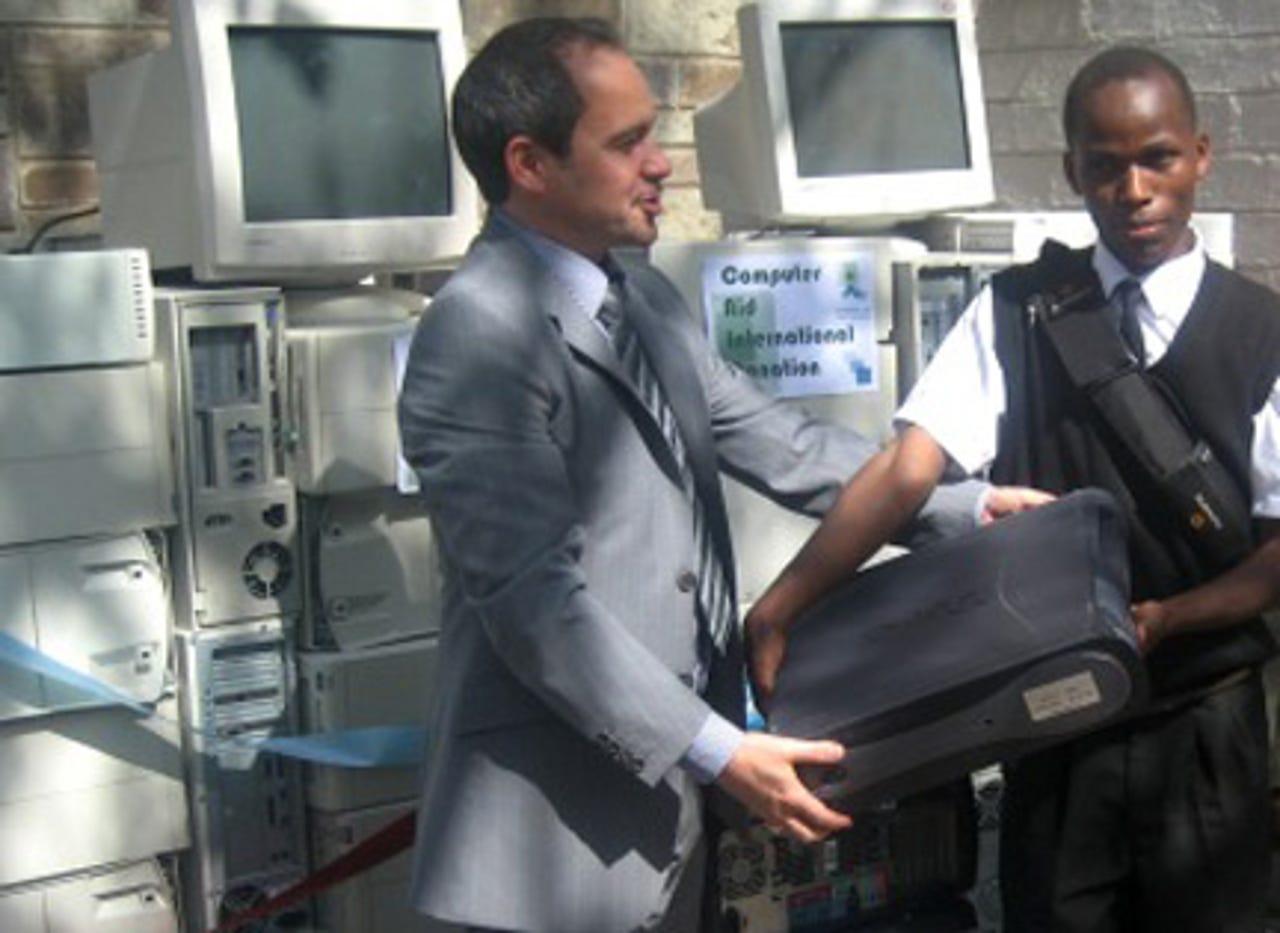Photos: How old PCs are creating opportunities


Tony Roberts (left), chief executive and founder of Computer Aid International, cuts the ribbon on a shipment of PCs delivered to Kenya and hands over the first piece of kit to a pupil at Starehe Boys' Centre.
The ribbon-cutting ceremony in Nairobi was watched by a group of visitors from the UK's IT industry, who were in Kenya to take part in a 400km fundraising bike ride across the country. The group raised enough money to put complete computer suites in 30 Kenyan schools. Among the riders were three from ZDNet UK's publisher, CNET Networks UK, who raised more than £16,000 for Computer Aid International.
Computer Aid's Kenyan partner, Computers For Schools Kenya (CFSK), receives thousands of PCs, servers and monitors from organisations both in Kenya and abroad — including Computer Aid .
These typically come from companies that are upgrading their own PCs and decide they want their old machines recycled responsibly.
Students at Ndururumo Secondary School in Nyahururu, in the highlands north of Nairobi, were among some of the first to benefit from the work of Computer Aid International (CAI) and Computers For Schools Kenya (CFSK) in Kenya. The students have use of 20 well-maintained PCs in a purpose-built computer suite.
PCs provided by CAI are all Pentium II or above. As part of its agreement with schools, CFSK ensures they are regularly serviced and well-maintained.
CFSK will only donate PCs to schools that accept 20 machines — to ensure as many children as possible get to work on a PC — and are able to provide a dedicated classroom space for them.
The charity will also work with schools to set a curriculum, train teachers in IT and ensure there is a reliable supply of electricity to power the PCs. As many schools such as Ndururumo are in rural areas the latter criteria is essential.
Edwin Martins, one of CFSK's co-ordinators in Nairobi, says these criteria are essential to guarantee PCs only go to schools that are committed to getting students online.
PCs come installed with Windows 2000 and these students are using Microsoft Word to prepare essays and documents. One of the 2,000 teachers trained by CFSK assists the children in their work.
Critics of such recycling schemes suggest organisations such as Computer Aid International are simply passing the buck when it comes to recycling, and are dumping useless kit on the developing world.
Although some evidence has been found to support these claims, organisations such as CAI and CFSK say they are determined to avoid the pitfalls some well-intentioned charities have fallen into.
As well as ensuring all PCs are in good working order before being sent to schools, CFSK ensures they remain in service for as long as they deliver value to the schools. When it is no longer useful to schools, the old kit is put to good use elsewhere.
CFSK's Edwin Martins (above) says Kenya is far better equipped to extract end-of-life value than consumer cultures in the West that will bin things more quickly.
Martins explains that many components, such as metals from a motherboard, can be re-used, and says Kenya's growing population of skilled electricians is finding uses for many power supply units, cables and wiring which might otherwise have been sent to landfill in the UK had they not been sent to Kenya.
Another effort of CFSK is to turn old monitors into fully working television sets, which can be sold for a fraction of the cost of a new or even second-hand set.
Getting televisions into more homes is another step in bridging digital, economic and particularly social divides. Kenya is still a fairly fragmented country, where basic infrastructure such as roads is poor. Away from the capital, ignorance about issues such as Aids is also hugely problematic. TV will enable greater countrywide education and social cohesion.
These TVs even come with a fully working remote control thanks to CFSK's engineers, who are committed to reusing as much supposedly defunct IT equipment as possible.
As for the cycle challenge itself, three employees from ZDNet UK's publisher, CNET Networks UK — (from left) Will Sturgeon, managing editor of silicon.com; Helen Cooke, marketing manager of CNET Networks UK; and Andrew Donoghue, executive editor of ZDNet UK — completed the 400km cycle from Nyeri to Kisumu in five days, raising more than £16,000 in the process for Computer Aid International.
The route took them into and out of the Rift Valley, climbing extreme hills and crossing harsh terrain in temperatures in the high 30° as they crossed the equator four times in the course of the week (read more here).